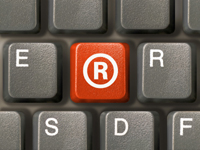Keyword Ads and The Public’s Domain in Trademark Law
 When you type a phrase like “Ford models” into a search engine, you aren’t necessarily searching for the Ford Motor Company. You may be searching for information from news sources to learn if Ford tires still catch fire. If that were the case, you’d probably want an disinterested analysis from outside the company. Or you may want something totally different: the Ford modeling agency, a toy model of a car, or a tiny likeness of a former president.
When you type a phrase like “Ford models” into a search engine, you aren’t necessarily searching for the Ford Motor Company. You may be searching for information from news sources to learn if Ford tires still catch fire. If that were the case, you’d probably want an disinterested analysis from outside the company. Or you may want something totally different: the Ford modeling agency, a toy model of a car, or a tiny likeness of a former president.
The point is, consumers, particularily those on the Internet, are active judges of information. They navigate multiple meanings of words as they search for useful information. Trademarks promote the efficiency of commercial speech by exclusively assigning brands to owners. This allows consumers to discuss or compare “The Hummer” and “The Canyonero,” as unambigious branded entities.
Trademark law confers specific affirmative rights to mark holders, namely exclusive brand use in named markets. It also sets out negative rights for consumers, specifically the prevention of trademark use that would be likely to cause confusion.
This focus on the avoidance of likely confusion is a valid, though limited, benefit to consumers. Being free from confusion is one element within the substantially larger need that markets, and consumers, have for efficient communication about products.
Problems arise when brand holders restrict the use of their registered names in public and commercial communications that merely refer to their products. Such claims increase the value of their marks, reduce the effectiveness of competitive speech, and prevent even the remotest chance of confusion by constricting otherwise beneficial communication.
But this assessment misses the broad need for people and markets to have unfettered access to information about products and commerce.
At last summer’s Intellecutal Property Scholar’s Conference at DePaul University, Laura Heymann proposed the useful idea of an equivelant to public domain in trademark law. (A podcast of her presentation is available here.) Such a concept would provide an assertable public interest in effective speech, which would provide for fair use of trademarks in public and commercial dialogue.
Currently, search engines allow trademark holders to effectively ban the use of their registered names in keyword advertising by anyone other than themselves. While wrapped in a defense of “preventing confusion,” such policies in fact prevent both public dialogue about those brands and the positioning of legitimate statements by competitors.
Absent this structure, search engines reduce their own legal risks by allowing brand holders to have a monopoly on paid search placments triggered by their registered names. This prevents news organizations, non-profits, or even blogs such as this one from positioning relevant content before consumers with expressed interests in specific brands or corporations.
As cases such as American Airlines v. Google proceed, it is important to introduce the affirmative rights consumers have for information, along with the speech and trademark rights maintained by businesses.

 The future of digital experiences will be built by strategists who grasp the full array of emerging business, social, and technical models. Specialties in user experience, branding, application design, and data science are laying the foundation for richer user experiences and business models breakthrough products and revenue based marketing.
The future of digital experiences will be built by strategists who grasp the full array of emerging business, social, and technical models. Specialties in user experience, branding, application design, and data science are laying the foundation for richer user experiences and business models breakthrough products and revenue based marketing.
1 Response to "Keyword Ads and The Public’s Domain in Trademark Law"
November 25, 2010
[…] often noted that trademark rights can’t be used to encumber efficient commercial and even competitive […]